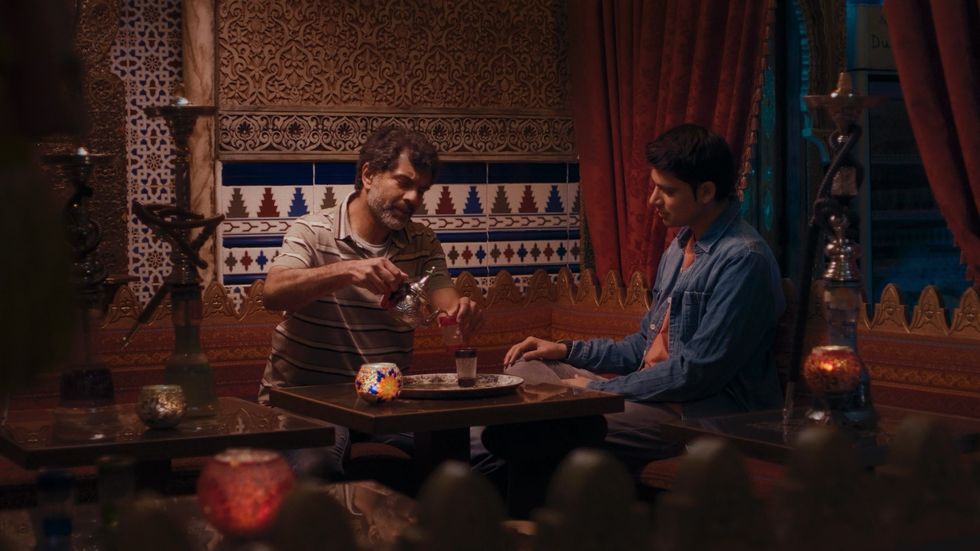THE TALENTED BRITISH WRITER-DIRECTOR DISCUSSES HIS DEBUT FILM GRANADA NIGHTS
by ASJAD NAZIR
THE 2021 UK Asian Film Festival will once again serve up a feast of fascinating cinema.
A big highlight from the 23rd edition of the long-running festival will be Granada Nights, which revolves around a heartbroken British-Pakistani in Spain who pushes himself out of the comfort zone and attempts to start again.
The directorial debut from Abid Khan has been described as a love letter to Granada and a search for a sense of belonging. Khan was happy to discuss his delightful drama, cinema and inspirations.
How did you feel when your film got selected for this year’s UK Asian Film Festival?
I am excited and honoured to be part of a film festival that champions south Asian talent and culture. I have followed the festival for many years and am delighted to share my debut feature Granada Nights with UK Asian Film Festival audiences. It is one of the longest running south Asian film festivals and I feel privileged to be selected and a part of that history.

Tell us about the film?
Granada Nights is a self-discovery feature film about a British tourist played by Antonio Aakeel, stuck in Granada, Spain, after a break-up. Feeling lost and abandoned, he befriends a group of young foreigners and crashes into the heart of the international student scene. He pushes himself out of his comfort-zone and tries to restart his life, but behind every corner is a reminder of his ex-girlfriend and struggle to find closure. It mixes documentary with fiction to create an authentic heartfelt examination on the process of self-discovery.
What was the biggest challenge of making the movie?
The biggest challenge was to write, produce and direct my debut feature, and shoot it with an international ensemble cast in a foreign city where English is not widely spoken. It was a challenge I relished because it was important for me to capture the real authentic experience of being a foreigner in Spain. The difficulties in language, culture and identity plague many south Asians and I really wanted to set this in a transient city that is a melting pot of cultures that it inherited throughout its history.
What is your favourite moment in the movie Granada Nights?
At midpoint, Ben, played by Antonio Aakeel, meets Bilal, a Pakistani rose seller, played by Ezra Faroque Khan. They have a discussion through the Moroccan district and share a convers ation on identity and what it means to be a foreigner in a foreign country. In this scene, as a director, I am expressing my deepest feelings to the audience.
Who are you hoping connects to this film?
Curious minds who dream about travelling and escaping to a foreign country. There is romanticism too with the idea of following your heart and throwing yourself into the unknown. It is aimed mostly at young people seeking adventure and connection, as well as older audiences who will be nostalgic about the first time they travelled abroad.
What can we expect next from you?
I’m currently working on a film and TV series that further explores identity and self-discovery within young people. I’m fascinated with coming-of-age stories from my own cultural background and shining a light on diverse stories that haven’t had an opportunity to be told in mainstream media.
Who is your filmmaking hero?
I don’t have a filmmaking hero, but I do admire a variety of directors who push the boundaries of storytelling.
What inspires you as a filmmaker?
People inspire me because inherently all film is about telling stories that are about the human condition. So, what better way to be inspired than divulging in humanity, travelling to distant lands and learning about other cultures and losing yourself in the process.
Why should we all watch your film?
Granada Nights is a feature for your senses, which brings you into the magical city of Granada as a tourist and leaves you feeling a sense of belonging and nostalgia. The film mixes documentary with fiction and you get a real feel of authenticity, as we journey with Ben while he discovers the city, his new friends and ultimately himself. With the pandemic easing and international travel starting to open up, this is the perfect feel-good film to welcome in the summer.
www.tonguesonfire.com






 Nigel Farage
Nigel Farage Rupert LoweGetty Images
Rupert LoweGetty Images











 Rajan offers the pind daan in honour of his father and ancestors
Rajan offers the pind daan in honour of his father and ancestors 


 LONDON, ENGLAND - JUNE 22: Baroness Floella Benjamin speaks during the unveiling of the National Windrush Monument at Waterloo Station on June 22, 2022 in London, England. The photograph in the background is by Howard Grey. (Photo by John Sibley - WPA Pool/Getty Images)
LONDON, ENGLAND - JUNE 22: Baroness Floella Benjamin speaks during the unveiling of the National Windrush Monument at Waterloo Station on June 22, 2022 in London, England. The photograph in the background is by Howard Grey. (Photo by John Sibley - WPA Pool/Getty Images)
 Ed Sheeran and Arijit Singh
Ed Sheeran and Arijit Singh Aziz Ansari’s Hollywood comedy ‘Good Fortune’
Aziz Ansari’s Hollywood comedy ‘Good Fortune’ Punjabi cinema’s power-packed star cast returns in ‘Sarbala Ji’
Punjabi cinema’s power-packed star cast returns in ‘Sarbala Ji’ Mahira Khan
Mahira Khan ‘Housefull 5’ proves Bollywood is trolling its own audience
‘Housefull 5’ proves Bollywood is trolling its own audience Brilliant indie film ‘Chidiya’
Brilliant indie film ‘Chidiya’  John Abraham
John Abraham Hina Khan and her long-term partner Rocky Jaiswal
Hina Khan and her long-term partner Rocky Jaiswal  Shanaya Kapoor's troubled debut
Shanaya Kapoor's troubled debut Sana Yousuf
Sana Yousuf